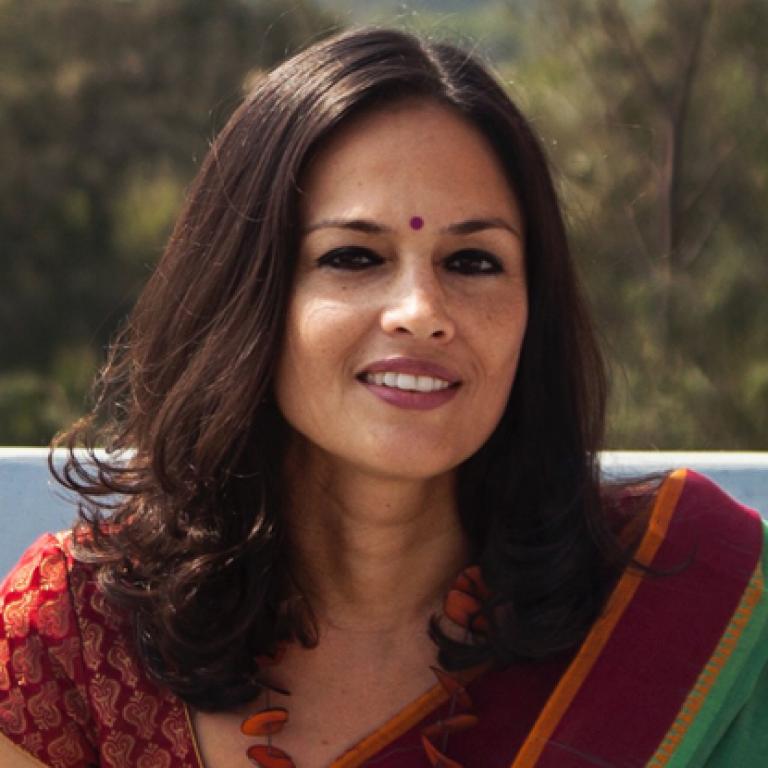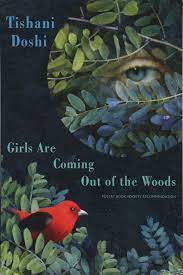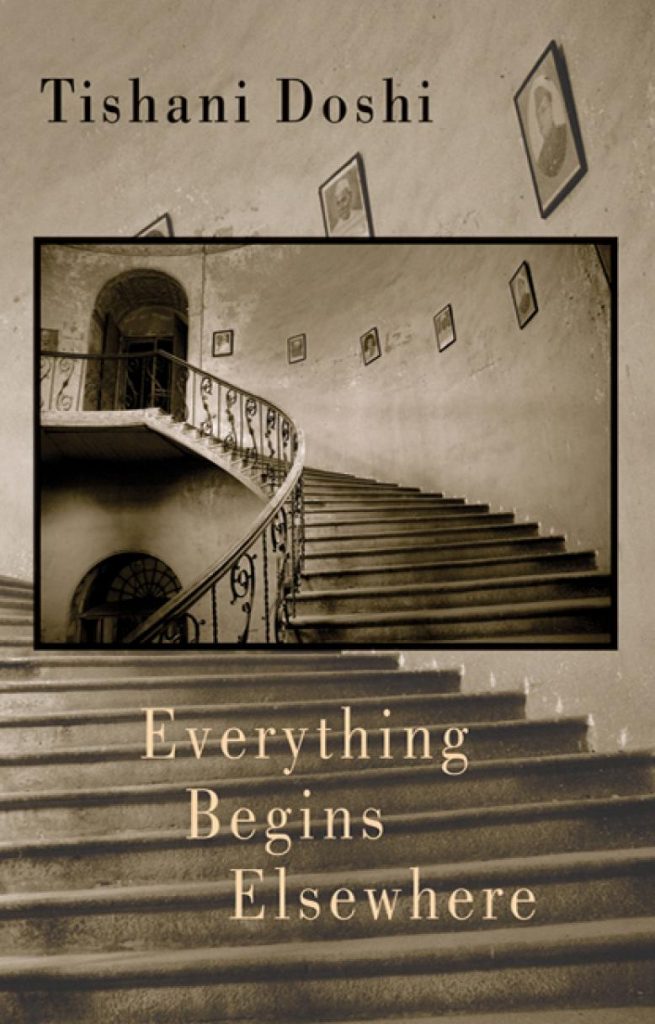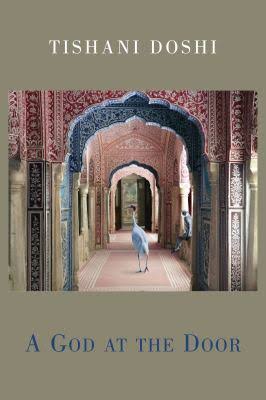‘HERE WE STILL ARE’: AN INTERVIEW WITH TISHANI DOSHI
And because the news is so full
of horrors and counterfeits, can we for once
not be sceptics and succumb to the romance
before us? Forget that the tree is moving,
that one day its phantom limbs will tap
against our door. Till then can’t we stand
by our windows and stare at all the desolation
and sweetness. (‘Tree of Life’, A God at the Door)
The pandemic has taken a lot from everyone over this past year but my conversation with Tishani Doshi is one of those rare examples where a world in isolation and an increase of online connectivity turn into blessings. Tishani Doshi greets me from what seems like an oasis. I call online from my flat in Dundee to her, by the sea in India, Tamil Nadu – my morning, her afternoon. I speak to her just days after her appearance at StAnza poetry festival. She has a beaming smile when she tells me about her online reading experience – this smile turns to laughter when she elaborates on how her internet just gave up towards the end and kicked her off her own reading.
The room she calls from is picturesque – lots of wooden furniture, a cabinet filled with books, and a great presence of light as the sun comes streaming through the windows. After a year of living in the strict quarters of our homes, I am quick to grow jealous of anyone living in a different location to mine, a dissimilar climate, or merely a home with different coloured walls. Doshi’s content smile, breezy linen outfit, and sun-soaked living space present a writer’s life in lockdown as a dream.
We discuss Doshi’s third poetry collection, Girls Are Coming Out of the Woods, and the idea of performance – a feature which perfectly accompanies her multi-dimensional work. Doshi dances, writes novels, and crafts poetry. Girls Are Coming Out of the Woods, published in 2017, explores the female body, boundaries and violence, all with her characteristic sharpness. On her performances from this collection, Doshi says, ‘It was my friend who had the idea, and suggested doing something at an art fair in Dubai. Before that, I had only ever worked with a choreographer, I had never tried to do my own, I just didn’t think about it.’
Doshi relates the performance of her writing to a sense of closeness with her audience. Comparing this collection’s celebration of movement with her new one, she says, ‘I kept waiting for something with A God at the Door to happen, but nothing ever did.’ Linking this to the pandemic, lockdown, and the consequence of isolation, she continues, ‘I felt no urge to dance, or to perform, or think of the audience and I think it is because I feel very removed from it.’
I relate to this notion of removal deeply. At a time where a call has to replace a hug, and we are forced to sit still, a sense of removal has become normal, if not necessary. I understand how writing itself might at times feel absent of movement. I ask her about the influence location has on her writing, and if being stuck in a lockdown has stunted her craft. I ask this question to ease my own mind which has recently felt restricted and particularly uninspired. In response, she explicates her many muses – the most prominent being her home, India:
Some landscapes speak to you more than others, so you find yourself engaging with it more but other times you feel alienated. I am really interested in place; with my last novel Small Days and Nights, the place I live is almost a protagonist – the sea and the landscape are very much an atmosphere breathing through the novel. It is almost a person, like how a house can be a person too.
She pauses complimenting her home for a moment and advocates the urgency of travel instead – relabelling it as a purposeful knocking off of your centre. Doshi simplifies the effect of travel to leaving and returning; ‘The return journey is a sense to recentre myself – India represents finding my centre again.’
Doshi is known for her acute, perceptive, and unapologetically vigorous tone. It comes as a surprise to me that she has enjoyed the silence that has come hand in hand with the pandemic restrictions. ‘There were days of silence: no heavy machinery because people weren’t working, no aeroplanes, it was incredibly quiet. It was a very comforting thing that didn’t scare me at all – I like silence. I didn’t miss that bustle or buzz.’ Although I cannot relate to her love of silence, as I miss greatly crowded parks, busy streets, and the loud presence of life everywhere – I can appreciate quietness and its power. Though Doshi’s work has a distinct vibrance, and liveliness, her method requires silence. ‘In order to create, you need a lot of space and quiet, or you need to be able to not hear other people’s noise and just hear [what’s in] your head.’
As I steer the conversation towards the digital, Doshi comments on her trust and her fears – speaking on both the sense of connection technology brings and the disruptive disconnection it engenders. ‘It is an interesting medium. I do feel that it is some kind of noise and intrusion, so like with everything else there needs to be boundaries. It can be very powerful and it can suck you in. You need to navigate that,’ she says. In the year of digital connection, online relationships, and increased death rates the choice to opt out of digital noise seems an unlikely outcome. Tackling both in her essay, ‘How to write an elegy in the year of dying’, Doshi writes about the death of her beloved wild dog Bagheera and the sound of collective grief. She writes, ‘In all our isolation […] we have found ways to keep each other company through sound.’
Doshi, acknowledging the spectrum of sound – the voices that ought to be heard; the noises that must be shut out – unpacks the enchantment of spoken poetry:
I do feel that the most magic part, especially of poetry, is to have it spoken; to have an audience and the electricity – when we do get back to that it will be all the more powerful. I think that online readings are a way to send little signals to say: here we still are.
When I ask Doshi about her time throughout lockdown, she tells me about her unique experience, across three different countries: Abu Dhabi, Italy, and India. She shares stories about her students and teaching in Abu Dhabi, ‘I realised that to teach means to be a life-long student. I learn a lot from my students. I think I have developed a better ear for editing my own work too,’ she observes.
Later in lockdown Doshi was briefly trapped in Italy. She speaks about the pleasant experience of witnessing Italy in the summer and the beginning of Autumn – a season she had not experienced in years – which she does not really think of as being ‘trapped’ indoors. She does, however, articulate the delight of returning back home to India, most importantly to her books.
Her travels, the news of the world, and the constant uncertainty around her undoubtedly facilitated her writing:
It has been a very fruitful time. I have been very productive. I wrote a lot of the poems in A God at the Door during lockdown. I think I am a person who has allowed for a kind of restlessness in life; I have always enjoyed a restlessness and have had the opportunity to travel with work – I have always said “yes” to movement. I actually have come out of it thinking, it is great to move, but it is important to stay still more often.
Although I find it extremely difficult to be present and stay put, I understand the importance of it, especially in the pursuit of creation. However choosing to sit still, and being forced to be still – an experience all of us have been obliged to come to terms with recently – are two entirely differing worlds. Reflecting on her lockdown learnings, Doshi declares, ‘You learn that place is just an illusion, and writing and an imagination takes you wherever you want to go. Writing is a way to transcend all things that trap you or hold you in real life. It is a great power.’ Doshi’s patience and kindness radiates in our conversation, discussions about exploring her craft and creations quickly becomes a reassuring, encouraging exchange about life’s hardships.
A God at the Door tells stories of politics, femininity, rape, death, and other harsh, difficult and inevitable realities in our contemporary world. Politics and womanhood are thoroughly represented in her poetry collection – these themes are not foreign to her other works, Girls Are Coming Out of the Woods, Small Days and Nights, and Everything Begins Elsewhere. I am fascinated to know what drives her writing ambition, what she feels is at the root of her poetry, and if she struggles to produce her eloquent and acute perception. Doshi responds, ‘A lot of the poems in A God at the Door are poems about the idea of our bodies, our universe, and our environment. There are two types of poems in this collection, and there was no challenge to write any of them.’ My admiration for her craft, its wit, and vivacity doubles.
Writing A God at the Door, Doshi says, ‘This collection came from responding to news items and things I was reading, things that worried me, things that I found funny or disturbing. I was then using that as a way to then write a poem interested in the way that language can be transformative from journalism into poetry.’ She spends time commending poetry in particular for its immediate quality and readiness: ‘Poetry is really elastic and of all of the forms of writing that we have available I think that poets are the ones that have been able to respond to everything. The nowness and immediacy is what I am interested in – in that sense I think poetry is magic.’ And I think to myself anyone who reads Doshi’s work, and takes in its critical eye and present nature will understand the validity of her statement ‘poetry is magic’.
In order to press Tishani on her talent and her process, I ask for her thoughts on writing as spiritual practice, and the influence of spirituality in her most recent poetry collection.
‘With the title A God at the Door there is the question of what God? With everything in life I wanted to do it with a sense of sacredness, a sense of aliveness. For me the sense of environment, the nature, the landscape, our bodies, and how we fit in these places is always very spiritual.’ With this, I am overcome with a sense of melancholy for a period of time in my life before the pandemic – where a varied environment is normality, and the landscape around me can be surprising and inspiring rather than predictable.
Our conversation descends into the joyful surprise of writing and the dreaded appearance of writer’s block. Her collected disposition matched her instruction; she says simply just to keep going. She declares, in a tone which isn’t patronising nor all-knowing, but one that is accommodating and humble – ‘All you need to do is start writing.’
I think that writing is essentially mysterious – which ties into the spiritual nature of it. Where do these ideas come from? How do you begin a poem? I have been doing it for years now and every time that I haven’t written a poem in a really long time, I still think “how did I do that?” I think that is really important – to have the continued mystery about writing. But I want to be looking. I don’t want to just be there. I want to feel a sense of journeying and a sense of seeking – those are important to me and always have been.
As my list of questions draws to a close, I am eager to speak with her about the illusion of female freedom and security, in today’s society. Doshi’s voice has always been unwaveringly fierce, rhythmic, and feminist. In recent years where female safety and equality is being tested constantly, I ask Doshi how it bleeds into her work. On a topic that permanently enrages and deeply upsets me I feel comfortable discussing such a pressing issue with her. I ask, has she been moved by the way women through craft, art, and writing have kept each other company?
‘I think that is almost the very central place from which my work comes from – this sense of reclamation. How do we reclaim everything that is brutally taken from us? It is really important that we find ways to reclaim and empower and keep each other company because it is overwhelming to feel alone… It is very brutal,’ she notes. ‘It has always been in my head this question of what does it mean for women, in a body that we empower so much duty, to be brutalised in this way? How are we to have dignity and go on?’
Her latest collection has a foundation that feels similar to a life-raft, or a guide to modern day survival. Girls Are Coming out of the Woods and A God at the Door are destinations to witness these vital, incessant questions, alongside honest answers. The idea of the collective, in relation to feminism, is also at the heart of her writing. ‘There is something very moving about being able to come together with strangers either protesting on the street, a private communion, or a reader saying how much a poem has helped them. This is what we have. This is what holds us together as people.’
Whilst each question I ask is critically considered and addressed by Doshi – she returns the favour and leaves me with questions to consider too. In the true spirit of deliberating the world around us, one question can only lead to many more. The topic of misogyny isn’t going to end overnight, and with this in mind Doshi queries, ‘Every once in a while there is a story in every nation that makes everybody stop and say: What are we doing? Why is this still happening? How do we go forward? Will we ever stop talking about this?’
She leaves me grateful for the time that she has spent with me. I imagine her afternoon would otherwise have been spent walking down the beach with her wild dogs, finishing Natalie Shapero’s Popular Longing, or reading a ridiculous headline and putting pen to paper. Her final questions leave me wondering when a day will come that I can read a powerful feminine voice and contemplate the privilege of womanhood entirely removed from the fear of violence.
Mhari Aitchison
Notes:
[1] Doshi, Tishani, Girls Are Coming Out of the Woods (Northumberland: Bloodaxe Books, 2017)
[2] Doshi, Tishani, A God at the Door (Northumberland: Bloodaxe Books, 2021)
[3] Doshi, Tishani, Small Days and Nights (London: Bloomsbury Circus, 2019)
[4] Doshi, Tishani, Everything Begins Elsewhere (Northumberland: Bloodaxe Books, 2012)
[5] Doshi, Tishani, How to write an elegy in the year of dying: Poet-novelist Tishani Doshi on the death of her dog (2020)





Great interview. Doshi is a great writer, poet, and performer. We’ll see some major awards for her before long.